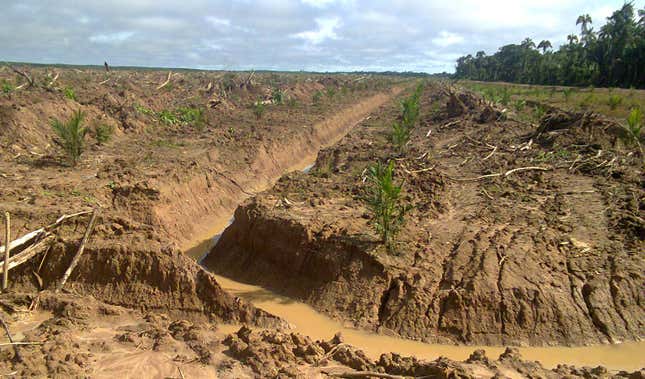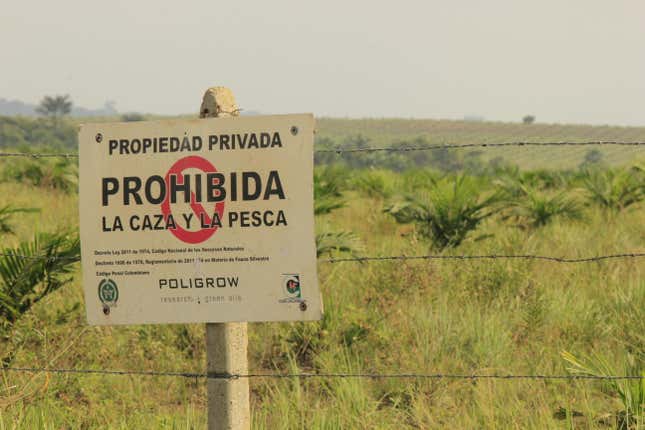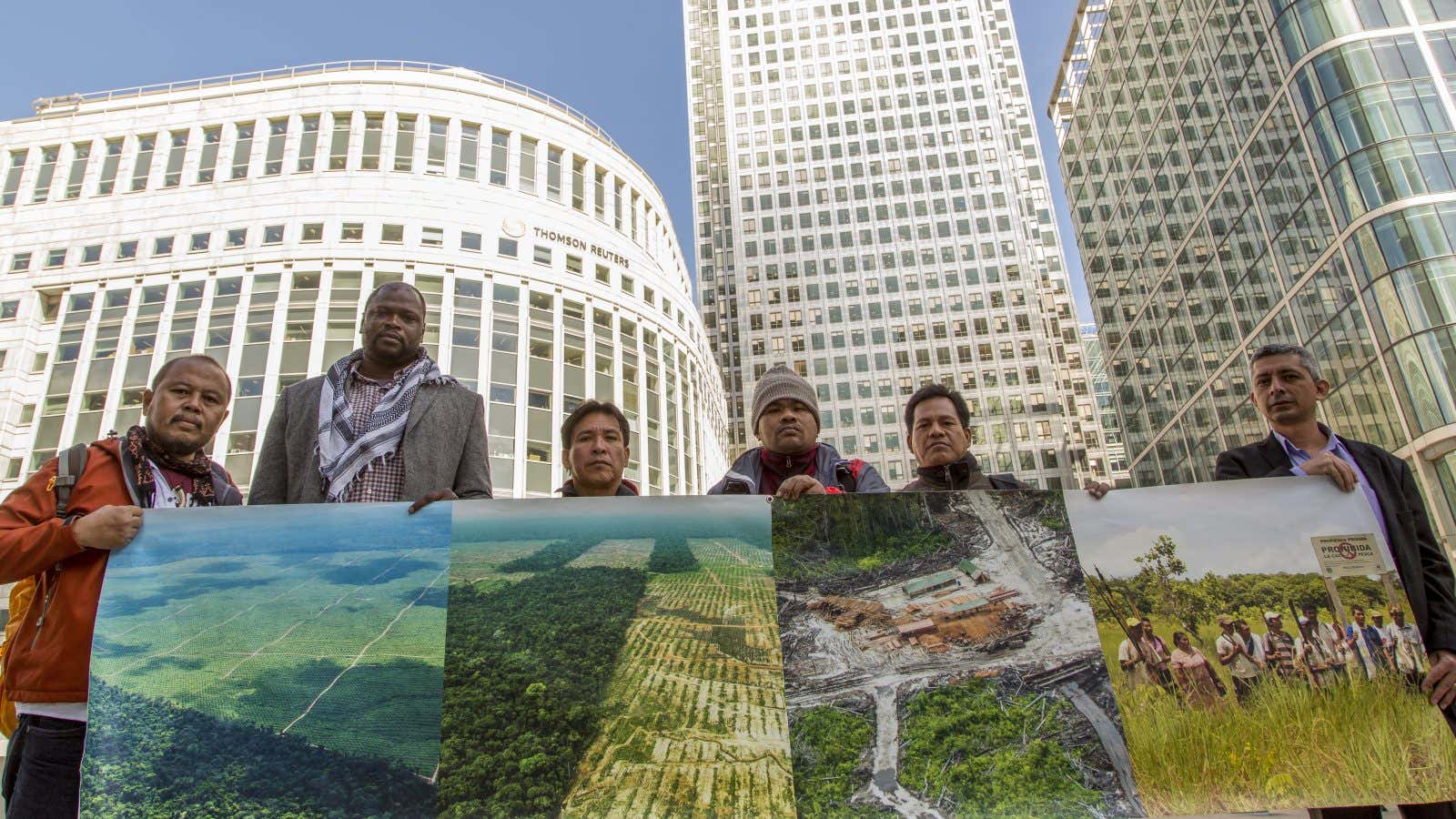Willian Aljure bangs his hand on the table. He’s speaking in Spanish, trying desperately to make a roomful of quiet, laptop-focused London journalists absorb his point:
“It cannot be a coincidence,” he says, anger rising in his voice, “that four countries are talking about the same damage.”
Aljure represents indigenous communities in Colombia that he says have been decimated, their lands grabbed and their forests cut down, by large agribusiness operations planting biofuels and palm oil. Nine members of his family have died as a result of the companies’ aggression and destruction, Aljure says, and the last was his mother. His voice cracks. He passes the mic, drinks from a glass of water, and covers his eyes.
On his right are community leaders from Indonesia. On his left, representatives from Peru and Liberia. All have similar stories.
So far, so painfully familiar.
Many people are starting to learn that palm oil and other crops that require intensive farming practices are destroying forest in places such as Indonesia, where fires used to clear land have caused a cloud of deadly smog so dense it can be seen from space. What’s less well known is that those operations are spreading around the globe. The business model has sprung up in places as far flung as West Africa and South America, and governments, the indigenous leaders say, simply aren’t protecting their people.

That’s why those indigenous leaders from opposite ends of the earth are in London, Europe’s financial capital: They’re trying a new tack. This press conference is part of a desperate tour, organized with the help of several non-governmental organizations, that has taken them to Germany, Brussels and the Netherlands to meet with European Union officials and, crucially, investors. Their message is this: the system of self-regulation by companies that grow palm oil and other products in their homelands isn’t working. Consumers and investors in Europe have the power to change this by boycotting companies that destroy forests and cause the deaths of people and animals.
So what is actually happening where? Most of these figures come from the Forest People’s Programme, an NGO that advocates for the careful management of forests.
Indonesia
Planted with palm oil: 13.5 million hectares
Earmarked for future development: 2.5 million hectares
Indonesia’s palm oil industry dwarfs the rest of the world’s, for now. Indonesia is the biggest exporter of crude palm oil, producing 44% of all crude palm oil exported globally. Its 13.5 million planted hectares equate to an area a quarter the size of France.
Indonesia has also had one of the most problematic industries so far. Fires used to clear land have been called “the biggest environmental crime of the 21st century,” and have accounted for deaths of both adults and children, as well as hundreds of thousands of people with health problems ranging from respiratory conditions to the inhalation of particulates associated with Alzheimer’s Disease and Parkinson’s Disease. Campaigners say a profit-motivated government is allowing deforestation, logging, burning, and the displacement of indigenous peoples to take place.
Colombia
Hectares planted with palm oil: around 400,000
Earmarked for palm oil: 100,000 hectares
Colombia is the largest producer of palm oil in Latin America, and the fourth-largest in the world. The production of palm oil is supported by the country’s government, which has promised to bring a million more hectares of land under agricultural production by 2018.

But, as Willian Aljure pointed out, Colombia’s rural lands are contested. Companies have been accused of forcibly displacing rural communities and degrading land. Somos Defensores, a Colombian human rights group, says that between 2009 and 2015, 317 human rights defenders were assassinated in the country, and 1,400 received threats.
Peru
Planted with palm oil or being cleared for palm oil: 110,000 hectares
Earmarked for future development: 1.4 million hectares
The palm oil business is still small in Peru, but plans are wide-ranging. According to the indigenous community, some companies have already cleared virgin forest for palm oil production, destroying their homelands and threatening them when they protest.
The complaints have led to a government investigation into one company, Plantaciones de Pucallpa. In September 2015, the Peruvian government ordered the company to desist its activities until the matter was further investigated. But it also noted that over 99% of the land in question had already been deforested. The Roundtable on Sustainable Palm Oil (RSPO), an organization that includes industry members, environmental groups, banks, and other interested parties, sent a letter to the company in April 2016, also asking it to desist while investigations are completed. Reached by phone, Ulises Saldaña, manager of social responsibility for Plantaciones de Pucallpa, said that the company’s activities were entirely legal. He said that there had been no displacement of any indigenous peoples, and that accusations of intimidation were false and “irresponsible.”
Liberia
Planted with palm oil: 17,000 hectares
Earmarked for palm oil: 700,000 hectares
Several large international palm oil companies are operating in Liberia, and while operations are nowhere near the scale of some other places, problems with land rights, animal welfare, deforestation and pollution have already been reported, leading to several temporary suspensions of activities requested by the RSPO.
Ali Kaba, a program coordinator for the Liberian NGO the Sustainable Development Institute, which works with rural communities in Liberia, noted: “Palm oil in West Africa is not the problem; it’s native, people produce it for different reasons. The problem is human rights violations,” which he said included the enforced movement of people and land degradation, as well as higher food prices.
(Malaysia, which was not represented at the meeting, has about 5.6 million hectares planted with palm oil, according to government data.)
What next?
The delegation of leaders presented a letter (pdf) to London’s Alternative Investment Market, AIM, which is owned and operated by the London Stock Exchange. They asked it to de-list one member company, United Cacao, because of illegal deforestation and human rights abuses by its subsidiaries and companies it funded in Peru—including Plantaciones de Pucallpa.
A spokesman for United Cacao said that the company and its subsidiary Cacao del Peru Norte “categorically rejects any accusation that it has been involved in the intimidation of local people who live on the land.” He also said: “United Cacao operates in full compliance with all applicable Peruvian and environmental laws relating to planning, land use, development, operation and plantation standards.”
Consumers, meanwhile, are caught in a bind. Palm oil is so extraordinarily ubiquitous—used in both the food and cosmetics industries in everything from shampoo to sliced bread—that avoiding it is a mammoth task. The companies allegedly responsible for land degradation and human rights abuses are often difficult to connect to the beloved and familiar brands available on the high street.
There is, meanwhile, a lack of information about what’s actually going on. The leaders say this is because companies are not transparent: ”They say ‘we have policies,’ but in the field they do nothing,” said Agus Sutomo, the director of a local NGO in West Kalimantan, Indonesia. “They say they are not destroying the environment. They say they are not killing orangutans, but they are doing it. It’s only on paper.”
They also accuse the Roundtable on Sustainable Palm Oil of being toothless. A representative of the RSPO said the organization continues to strive for compliance from all its members, which produce 21% of all palm oil globally.
“Yes, RSPO certification can fail and does fall short of perfection,” said Danielle Morley, European director of outreach and engagement for the RSPO. But, she added, “The threat to rainforests and human rights abuses in palm oil would be worse without the RSPO, and protection for the environment and local communities is strengthened with increased membership.”
A London Stock Exchange spokesperson declined to comment.
